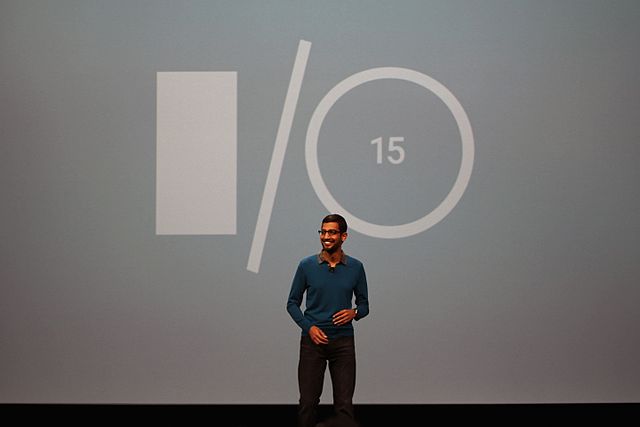Google has finally set the record straight on whether or not it will participate in developing AI-powered weapons of war.
In a Thursday memo and blog post penned by Google CEO Sundar Pichai, the company promised that it will not develop AI-powered technologies to be applied to weapons for the military. However, the company also maintained that it will continue working with the government and the military in other ways.
The lengthy memo started with Google reiterating its principles and objectives in developing AI technology. Then the company cited several areas where it does not want its AI tech developments to be applied.
Google maintained that any of its AI-powered programs shall not be used in “weapons or other technologies whose principal purpose or implementation is to cause or directly facilitate injury to people.”
Pichai also stated that Google’s AI tech will not be involved in projects with the objective of spying on people and gathering information in ways that violate “internationally accepted norms” as well as government programs that go against “international law and human rights.”
While Google said it will not participate in AI-related projects that will “cause overall harm,” Pichai clarified that the company will analyze if “the benefits substantially outweigh the risks” in projects where potential harm is seen. In these instances, Google promised to apply "safety constraints" as it lets organizations use its AI tech.
After making it clear that Google will not participate in developing AI-powered weapons of war, Pichai maintained that the company will continue working with the government and the military "in many other areas.” These include cybersecurity, military training, recruitment and search and rescue missions, among others.
Pichai’s letter came after Google was heavily scrutinized, even by its employees, when it reportedly signed a deal with the Pentagon to develop AI-powered war equipment.
According to an early March report from Gizmodo, Google allegedly partnered with the U.S. Department of Defense to create an AI tech — dubbed Project Maven — that can process drone footage to identify the subjects.
After the said collaboration leaked within Google’s premises, thousands of disgruntled employees reportedly signed a petition to persuade Google higher-ups to pull out of Project Maven.



 SoftBank and Intel Partner to Develop Next-Generation Memory Chips for AI Data Centers
SoftBank and Intel Partner to Develop Next-Generation Memory Chips for AI Data Centers  Nvidia CEO Jensen Huang Says AI Investment Boom Is Just Beginning as NVDA Shares Surge
Nvidia CEO Jensen Huang Says AI Investment Boom Is Just Beginning as NVDA Shares Surge  Nvidia Confirms Major OpenAI Investment Amid AI Funding Race
Nvidia Confirms Major OpenAI Investment Amid AI Funding Race  Amazon Stock Rebounds After Earnings as $200B Capex Plan Sparks AI Spending Debate
Amazon Stock Rebounds After Earnings as $200B Capex Plan Sparks AI Spending Debate  SpaceX Pushes for Early Stock Index Inclusion Ahead of Potential Record-Breaking IPO
SpaceX Pushes for Early Stock Index Inclusion Ahead of Potential Record-Breaking IPO  SpaceX Prioritizes Moon Mission Before Mars as Starship Development Accelerates
SpaceX Prioritizes Moon Mission Before Mars as Starship Development Accelerates  Elon Musk’s SpaceX Acquires xAI in Historic Deal Uniting Space and Artificial Intelligence
Elon Musk’s SpaceX Acquires xAI in Historic Deal Uniting Space and Artificial Intelligence  Nvidia, ByteDance, and the U.S.-China AI Chip Standoff Over H200 Exports
Nvidia, ByteDance, and the U.S.-China AI Chip Standoff Over H200 Exports  Anthropic Eyes $350 Billion Valuation as AI Funding and Share Sale Accelerate
Anthropic Eyes $350 Billion Valuation as AI Funding and Share Sale Accelerate  Palantir Stock Jumps After Strong Q4 Earnings Beat and Upbeat 2026 Revenue Forecast
Palantir Stock Jumps After Strong Q4 Earnings Beat and Upbeat 2026 Revenue Forecast  SpaceX Updates Starlink Privacy Policy to Allow AI Training as xAI Merger Talks and IPO Loom
SpaceX Updates Starlink Privacy Policy to Allow AI Training as xAI Merger Talks and IPO Loom  Instagram Outage Disrupts Thousands of U.S. Users
Instagram Outage Disrupts Thousands of U.S. Users  Global PC Makers Eye Chinese Memory Chip Suppliers Amid Ongoing Supply Crunch
Global PC Makers Eye Chinese Memory Chip Suppliers Amid Ongoing Supply Crunch  Google Cloud and Liberty Global Forge Strategic AI Partnership to Transform European Telecom Services
Google Cloud and Liberty Global Forge Strategic AI Partnership to Transform European Telecom Services  Oracle Plans $45–$50 Billion Funding Push in 2026 to Expand Cloud and AI Infrastructure
Oracle Plans $45–$50 Billion Funding Push in 2026 to Expand Cloud and AI Infrastructure 





























